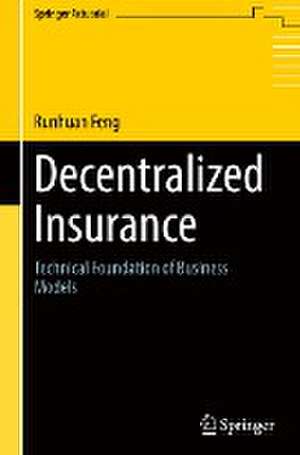Decentralized Insurance: Technical Foundation of Business Models: Springer Actuarial
Autor Runhuan Fengen Limba Engleză Hardback – 22 mai 2023
There is a mix of industry practices and academic models presented in this book. The exposition starts with an overview of historic and current business practices and preliminaries on the mathematics and economics of risk and insurance. A bird's-eye view of traditional insurance isprovided as a benchmark for various topics to be used in contrast with decentralized insurance. The book then continues with decentralized insurance practices around the world, including online mutual aid originated in China, takaful from the Islamic world, peer-to-peer insurance in the West, catastrophe risk pooling for Carribean countries, etc. Theories of aggregate risk pooling and peer-to-peer risk exchanges are provided for readers to appreciate the mathematical foundation of risk sharing. A unified framework of decentralized insurance is presented to show a structured approach to the economic design of decentralized business models. The book ends with a technical review of blockchain and decentralized finance (DeFi) insurance applications.
Preț: 786.84 lei
Preț vechi: 959.56 lei
-18% Nou
Puncte Express: 1180
Preț estimativ în valută:
150.58€ • 156.31$ • 125.56£
150.58€ • 156.31$ • 125.56£
Carte tipărită la comandă
Livrare economică 22 martie-05 aprilie
Preluare comenzi: 021 569.72.76
Specificații
ISBN-13: 9783031295584
ISBN-10: 3031295587
Ilustrații: XXIII, 263 p. 72 illus., 35 illus. in color.
Dimensiuni: 155 x 235 mm
Greutate: 0.58 kg
Ediția:2023
Editura: Springer International Publishing
Colecția Springer
Seria Springer Actuarial
Locul publicării:Cham, Switzerland
ISBN-10: 3031295587
Ilustrații: XXIII, 263 p. 72 illus., 35 illus. in color.
Dimensiuni: 155 x 235 mm
Greutate: 0.58 kg
Ediția:2023
Editura: Springer International Publishing
Colecția Springer
Seria Springer Actuarial
Locul publicării:Cham, Switzerland
Cuprins
1. Introduction.- 2. Risk Assessment and Measures.- 3. Economics of Risk and Insurance.- 4. Traditional Insurance.- 5. Decentralized Insurance.- 6. Aggregate Risk Pooling.- 7. P2P Risk Exchange.- 8. Unified Framework.- 9. DeFi Insurance.- Reference. – Index.
Notă biografică
Runhuan Feng is a Professor of Mathematics, Statistics, Industry and Enterprise Systems Engineering, the State Farm Companies Foundation Endowed Professor, the Director of Actuarial Science, and the Founding Director of Predictive Analytics and Risk Management at the University of Illinois at Urbana-Champaign. He is the Faculty Lead for Finance and Insurance Sector at the University of Illinois System’s Discovery Partner Institute in Chicago. Feng is a Fellow of the Society of Actuaries and a Chartered Enterprise Risk Analyst. He co-founded the Illinois Risk Lab, which facilitates interdisciplinary activities that integrate experiential learning for students with research problems from the industry or the society. Feng servesas an independent consultant to many corporations and startups and provides expert testimonies to law firms for public policy assessment and actuarial analysis. His consulting work has been used by the Illinois General Assembly for pension-related legislative proposals. Feng’s research has been recognized in the practitioners’ community through his applied technical contributions and presentations as invited speakers at industry conferences. He won the Institute and Faculty of Actuaries’ Geoffrey Heywood Prize in 2022. His recent interests are on business designs in decentralized finance and insurance and how distributed technologies can be best utilized to address emerging risks and societal challenges.
Textul de pe ultima copertă
The book offers an introduction to the technical foundation of decentralized insurance models, for advanced undergraduate students, graduate students and practitioners. The book is self-contained and anyone with a basic knowledge of probability and statistics should be able to follow through the entire book. It adopts a minimalist approach to describe the essential elements and first principles so that readers can get a gist of these models without being overwhelmed with too much technicality. It can be used as a reference for business model designs. The inclusion of exercises and practical examples makes the book suitable for advanced courses on decentralized insurance and risk sharing.
There is a mix of industry practices and academic models presented in this book. The exposition starts with an overview of historic and current business practices and preliminaries on the mathematics and economics of risk and insurance. A bird's-eye view of traditional insurance is provided as a benchmark for various topics to be used in contrast with decentralized insurance. The book then continues with decentralized insurance practices around the world, including online mutual aid originated in China, takaful from the Islamic world, peer-to-peer insurance in the West, catastrophe risk pooling for Carribean countries, etc. Theories of aggregate risk pooling and peer-to-peer risk exchanges are provided for readers to appreciate the mathematical foundation of risk sharing. A unified framework of decentralized insurance is presented to show a structured approach to the economic design of decentralized business models. The book ends with a technical review of blockchain and decentralized finance (DeFi) insurance applications.
There is a mix of industry practices and academic models presented in this book. The exposition starts with an overview of historic and current business practices and preliminaries on the mathematics and economics of risk and insurance. A bird's-eye view of traditional insurance is provided as a benchmark for various topics to be used in contrast with decentralized insurance. The book then continues with decentralized insurance practices around the world, including online mutual aid originated in China, takaful from the Islamic world, peer-to-peer insurance in the West, catastrophe risk pooling for Carribean countries, etc. Theories of aggregate risk pooling and peer-to-peer risk exchanges are provided for readers to appreciate the mathematical foundation of risk sharing. A unified framework of decentralized insurance is presented to show a structured approach to the economic design of decentralized business models. The book ends with a technical review of blockchain and decentralized finance (DeFi) insurance applications.
Caracteristici
Systematically exploits various practical & theoretical models of decentralized insurance & risk sharing Offers an introduction for students, entrepreneurs, & academics to decentralized insurance business models Discusses the latest developments in blockchain & DeFi insurance applications












